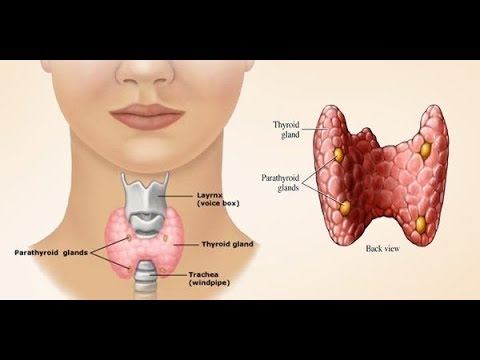
In today’s video I want to discuss the basics regarding how a ketogenic diet, or a diet with little to no carbohydrate, can affect your thyroid. By the end of this video you’ll have a solid understanding of whether or not the ketogenic diet is recommended for people who have:
Hypothyroidism
Or want a faster metabolism
This video is one of several in depth videos in my Keto (or ketogenic) diet exploration series taking a look at the many facets of the now very-popular ketogenic diet and how it affects different hormones and general health in the human body.
Thyroid hormones are essential to maintain and regulate carbohydrate/energy metabolism (1).
Conversely, the energy (glucose) we get from carbs is required to fuel the production of thyroid hormones.
This is because the parts of the brain ultimately responsible for thyroid hormone regulation – the hypothalamus and the pituitary gland – require glucose to function.
In fact, the main regulation hormone, called Thyroid Stimulating Hormone (TSH), is made up partly of glucose molecules (2).
In addition to these important roles, carb intake appears to influence the amount of T3 that gets converted from T4 thyroid hormone. This is important for hypothyroidism as T3 is the active thyroid hormone that you need to increase.
It appears that when carb intake is drastically reduced, conversion of T3 from T4 declines (3).
This could be explained by the possible interaction between insulin and the enzymes that convert T4 into the T3 (1, 4).
So to sum it up nicely: Thyroid hormones rely on glucose for production and conversion, especially the conversion of T3 from T4.
Now let’s talk about survival mechanisms.
The body naturally will downregulate metabolism through this pathway when it goes into a survival mode, physiologically… for example, extreme prolonged calorie restriction, long water fasts, will both causes the body to slow metabolic function, shuttling resources toward vital organs.
The ketogenic diet was originally designed, for therapeutic reasons in epileptic patients, with the intention of mimicking fasting on a physiological level.
I’ll do another video on the differences between the two later in this series, however one of the key differences between fasting and the keto diet is that water fasts are typically only done for short acute periods of time, for example 1-3 days, or in very extreme cases up to 30 days for people healing their bodies of cancers or autoimmune diseases – and water fasts are typically used as a means of healing and rejuvenation, since the body does not need to focus any energy on digestion and can focus on complete systemic rest. The keto diet on the other hand, since people are consuming and digesting calories, puts people into this physiological state for months to years at a time, therefore putting the body under a significant amount of physiological stress.
One of the manifestations of this long term stress response is a drastic slowing of thyroid – and therefore, metabolic – functioning. T3 conversion slows down significantly.
A number of small scale studies have shown that after a period of starvation, refeeding with carbohydrates – but not with protein or fats – normalised thyroid hormone levels (8, 9, 10).
In one of the studies, researchers evaluated the effects of restricting carbs at various levels (85, 44 and 2% of total energy intake) on thyroid hormones in healthy male participants.
Results found that the high carbohydrate diet had no impact, whereas the very low carbohydrate diet did. It caused decreased T3 levels, increased rT3 and free T4 levels (8).
Average T3 plasma concentrations after 11 days of high carbohydrate diet (white), control diet (grey) and low carbohydrate diet (black) in the healthy males. The * indicates a significantly lower T3 level for the low carb diet, which is not desirable in hypothyroidism.
These results are similar to those of another study where participants either fasted or received an 800 Kcal low calorie diet comprising of either 0%, 25% or 100% carbohydrate, for a period of 2 weeks.
The results showed T3 levels were reduced from both fasting and the 0% carbohydrate diet, but not from the 100% carbohydrate diet (11).
Follow Me On Social Media:
Website:
Blog:
Facebook:
Instagram:
Personal Instagram:
UMZU Products:
Shop For Supplements –
Shop For Books –
Use code “”YOUTUBE”” For 10% Off!
Thermo Diet:
Get The Thermo Diet Here:
Find Out If You Have Estrogen Dominance – 8






